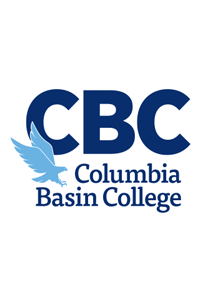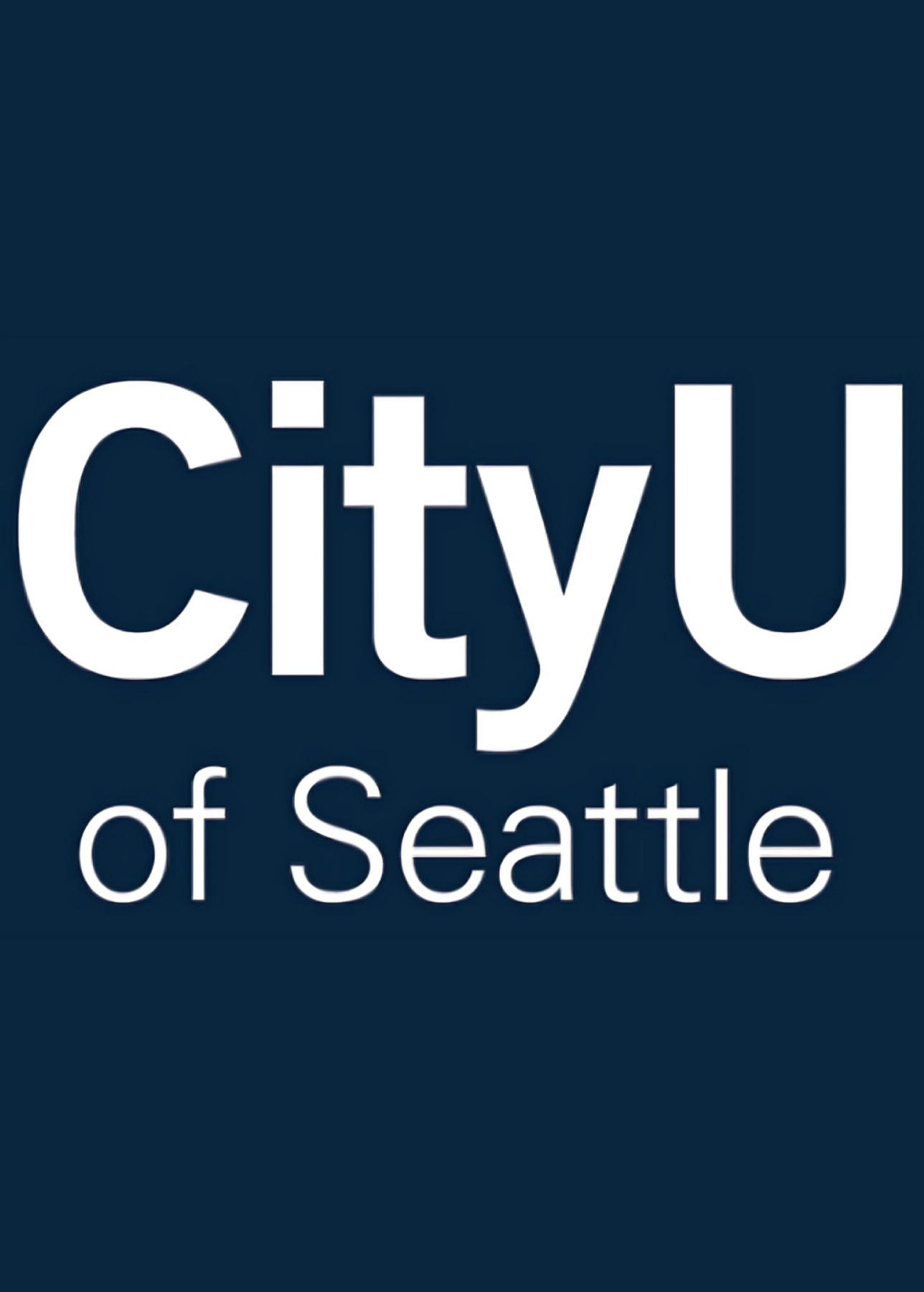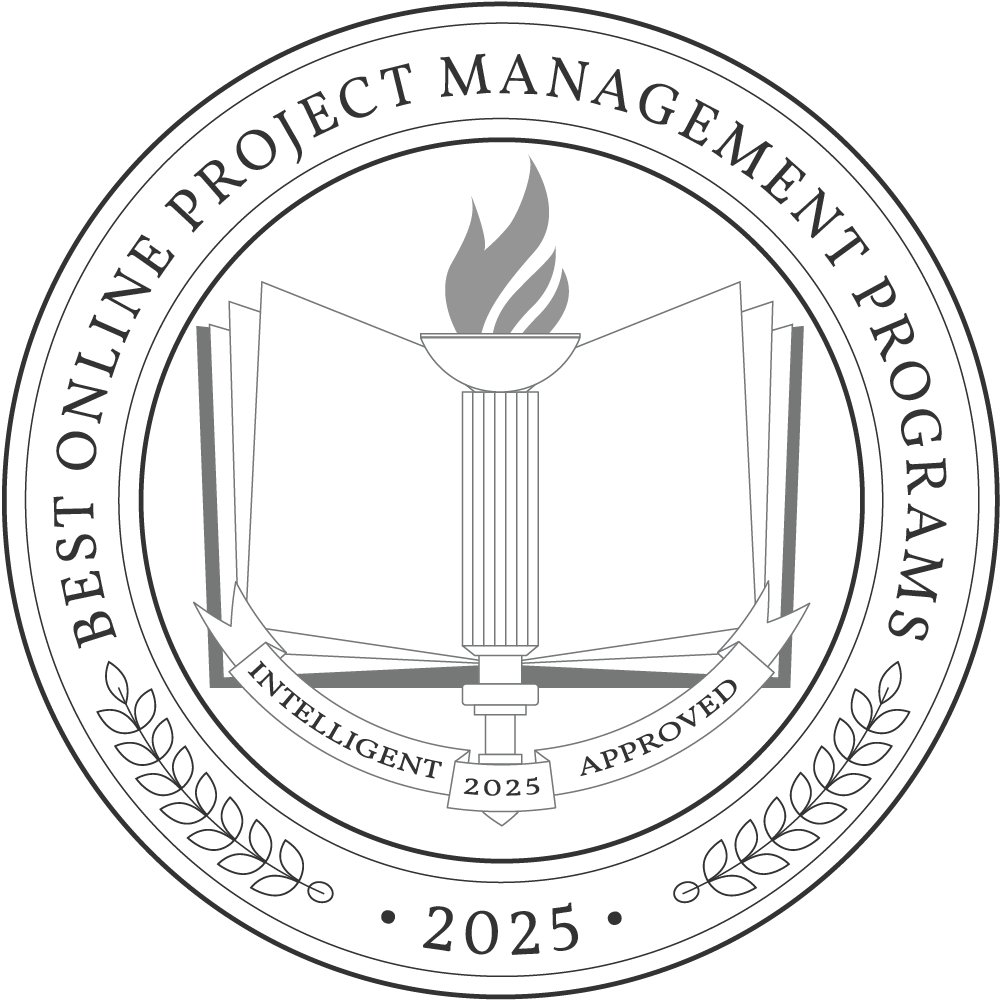Every industry, from marketing to construction, seeks adept leaders with project management skills. Enrolling in an online project management degree program will provide you with the necessary training to excel as a proficient and productive project manager, driving success and results with precision.
This comprehensive list highlights programs that will prepare you for these roles through rigorous coursework, real-world application, and expert faculty guidance. By attending a flexible online program, you can learn at your own pace from anywhere in the world. On average, the cost of college tuition is $14,688 for undergraduate programs and $20,513 for graduate programs.
Why Trust Us
The Intelligent.com Higher Education Team is dedicated to providing students with independent, equitable school and program rankings and well-researched resources. Our expert-driven articles cover topics related to online colleges and programs, paying for school, and career outlooks. We use data from the U.S. Department of Education’s College Scorecard, the National Center for Education Statistics, and other reputable educational and professional organizations. Our academic advisory team reviews content and verifies accuracy throughout the year for the most current information. Partnerships do not influence rankings or editorial decisions.
- Analyzed over 2,000 national, accredited, and nonprofit colleges and universities
- 800+ rankings pages are reviewed and updated yearly
- Content is informed by reputable sources, surveys, and interviews with academic advisors and other experts
- Over 100 data points are reviewed for accuracy and quality throughout the year, including sources
How we rank schools
Our list features the best online Project Management degree programs at top colleges nationwide. Each school featured is a nonprofit, accredited institution — either public or private — with a high standard of academic quality for post-secondary institutions.
We evaluated each school’s program on tuition costs, admission, retention and graduation rates, faculty, reputation, and the student resources provided for online students. We collected data from trusted sources like the National Center for Education Statistics, individual school and program websites, school admissions counselors, and other data sources. Then, we calculated the Intelligent Score on a scale of 0 to 100 based on the following criterion:
Academic Quality:
- Admission rate versus enrollment rate
- Retention rate of students who return after year one
- Accreditation status (regional and programmatic)
- Nonprofit status, both private and public institutions
Graduation Rate
- Overall graduation rate
- Total number of currently enrolled students, including diversity metrics
- Student-to-faculty ratio
Cost and ROI
- In-state and out-of-state per-credit tuition rates and fees
- Required credits to graduate
- Earning potential after graduation
- Availability of federal student loans, scholarships, and other financial aid options
Student Resources
- Available student services for online-only and hybrid programs
- On-campus amenities like tutoring centers and the number of libraries
Read more about our ranking methodology.
Best 19 Accredited Online Project Management Programs
FiltersInstitution Type
Status
- Intelligent Score
- Alphabetically By University Name
- Acceptance Rate
- Enrollment
- In-state Graduate Tuition
- Out-of-state Graduate Tuition
- In-state Undergraduate Tuition
- Out-of-state Undergraduate Tuition

CSU Global
Intelligent Score: 96.13In-state: $9,426
Out-of-state: $28,147
In-state: $10,520
Out-of-state: $10,520
SAT: 1070-1280
ACT: 23-29
$375
Online
Global Accreditation Center for Project Management Education Programs
120

George Fox University
Intelligent Score: 94.27In-state: $37,840
Out-of-state: $37,840
In-state: $14,112
Out-of-state: $14,112
SAT: 1020-1230
ACT: 19-28
$499
Online
Northwest Commission on Colleges and Universities
120

Minnesota State University Moorhead
Intelligent Score: 94.24In-state: $7,632
Out-of-state: $15,264
In-state: $8,910
Out-of-state: $8,910
SAT: 1080-1180
ACT: 19-24
$294
Online
Global Accreditation Center for Project Management Education Programs
120

Bellevue University
Intelligent Score: 93.71In-state: $7,176
Out-of-state: $7,176
In-state: $10,710
Out-of-state: $10,710
SAT: N/A
ACT: N/A
$449
Online, On Campus
Global Accreditation Center for Project Management Education Programs
127

Charleston Southern University
Intelligent Score: 93.39In-state: $27,800
Out-of-state: $27,800
In-state: $7,800
Out-of-state: $7,800
SAT: 990-1170
ACT: 19-24
$515
Online
Southern Association of Colleges and Schools Commission on Colleges
125

Columbia Basin College
Intelligent Score: 93.17In-state: $19,486
Out-of-state: $21,265
In-state: NA
Out-of-state: NA
SAT: N/A
ACT: N/A
Resident: $240
Non-Resident: $376 - $674
Online
Global Accreditation Center for Project Management Education Programs
180-182

Bemidji State University
Intelligent Score: 92.93In-state: $7,976
Out-of-state: $7,976
In-state: $8,012
Out-of-state: $8,012
SAT: N/A
ACT: 19-24
$313
Online
Higher Learning Commission
120

UMass Global
Intelligent Score: 92.51In-state: $63,560
Out-of-state: $63,560
In-state: $55,460
Out-of-state: $55,460
SAT: Not Required
ACT: Not Required
$500
Online
WASC Senior College and University Commission
120

City University of Seattle
Intelligent Score: 90.44In-state: $13,658
Out-of-state: $13,658
In-state: $11,812
Out-of-state: $11,812
SAT: N/A
ACT: N/A
$490
Online
Global Accreditation Center for Project Management Education Programs
180

Saint Louis University
Intelligent Score: 90.02In-state: $46,400
Out-of-state: $46,400
In-state: $21,420
Out-of-state: $21,420
SAT: 1160-1370
ACT: 25-31
$650
Online
Higher Learning Commission
120

Embry - Riddle Aeronautical University
Intelligent Score: 89.21In-state: $36,456
Out-of-state: $36,456
In-state: $18,228
Out-of-state: $18,228
SAT: 1140-1320
ACT: 23-29
$503
Online, On Campus
Global Accreditation Center for Project Management Education Programs
120

Saint Leo University
Intelligent Score: 88.88In-state: $23,990
Out-of-state: $23,990
In-state: $14,568
Out-of-state: $14,568
SAT: N/A
ACT: N/A
$410
Online, On Campus
Accreditation Council for Business Schools and Programs
120

Liberty University
Intelligent Score: 88.61In-state: $14,791
Out-of-state: $14,791
In-state: $7,935
Out-of-state: $7,935
SAT: 1040-1250
ACT: 21-29
$390
Online
Accreditation Council for Business Schools and Programs
120

University of Wisconsin - Stout
Intelligent Score: 87.88In-state: $9,273
Out-of-state: $37,161
In-state: $10,728
Out-of-state: $10,728
SAT: 1260-1460
ACT: 27-32
Resident: $244
Non-Resident: $529
Online
Accreditation Council for Business Schools and Programs
120

Davenport University
Intelligent Score: 87.26In-state: $19,320
Out-of-state: $19,320
In-state: $15,696
Out-of-state: $15,696
SAT: N/A
ACT: N/A
$974
Online, On Campus
International Accreditation Council for Business Education
120

Arizona State University
Intelligent Score: 86.11In-state: $10,710
Out-of-state: $28,800
In-state: $11,720
Out-of-state: $11,720
SAT: 1100-1320
ACT: 21-28
$563
Online
Higher Learning Commission
120

Southern New Hampshire University
Intelligent Score: 84.59In-state: $9,600
Out-of-state: $9,600
In-state: $18,810
Out-of-state: $18,810
SAT: N/A
ACT: N/A
$330
Online
Accreditation Council for Business Schools and Programs
120

Linfield University
Intelligent Score: 82.93In-state: NA
Out-of-state: NA
In-state: NA
Out-of-state: NA
SAT: 1050-1210
ACT: 20-27
$495
Online
Northwest Commission on Colleges and Universities
120
How to Choose an Online Project Management Program
Choose your area of study
Many programs will allow you to select a concentration and focus on managing projects for a particular industry, such as IT, healthcare, construction, or marketing. Certain concentrations may be available at some schools but not others — if you already know what you would like to do after you graduate, look for programs that closely match your career goals.
Research schools and programs
You should only apply to institutions that have been approved by a DOE-recognized regional accrediting organization, such as the New England Commission of Higher Education or Northwest Commission on Colleges and Universities. These organizations evaluate schools to ensure they provide students with a high-quality education. Those who attend a school that isn’t regionally accredited may be unable to access financial aid or transfer credits to another institution if needed.
Ideally, your online project management program will also be accredited by a respected industry group like the Association for the Advancement of Collegiate Schools of Business (AACSB) or the Accreditation Council for Business Schools and Programs (ACBSP). These programmatic accrediting organizations have particularly high standards for business education.
To learn more about any schools that you’re interested in, you can visit the school’s website, contact an admissions counselor, follow the school on social media, or attend an in-person or virtual open house.
Prepare for tests and applications
Application requirements vary by school and program. Create a study plan for standardized tests, dedicating consistent time for practice and review. For some students, an ACT or SAT test prep course is helpful. Transcripts are usually required, and you may need to submit letters of recommendation and a personal statement as well. And you should always contact an admissions counselor to ensure you have the most accurate information regarding program requirements and deadlines.
Select your program
As offers of admission arrive from your carefully selected schools, you can now confidently weigh your options with a comprehensive understanding of program specifics and your aspirations.
Before making your final decision, review your needs and goals again. Do you plan to attend school full-time or part-time? Do you want your program to be as online as possible, or are you fine with a hybrid program that has a fair amount of in-person requirements? Some programs offer asynchronous courses, which can be completed at your own pace, while others only offer synchronous courses, which involve remotely attending lectures and completing assignments at the same time as other students — which of these two online learning formats do you prefer? Your school should accommodate your scheduling needs and learning preferences.
Determine how you’ll pay for your degree
Speak to financial aid counselors at the schools you’re interested in for the most accurate and specific information about program cost.
Scholarships and grants are popular options for paying for college, as they don’t require repayment. Research and apply for scholarships related to project management, your specific academic achievements, and demographics. Complete the FAFSA to access federal loans, which often offer flexible repayment terms and lower interest rates than private loans.
It’s essential to prioritize securing grants and scholarships. However, if needed, you can supplement with federal loans, which can help ensure a manageable financial path in the coming years. Those who already work in the field should see if their employer offers tuition assistance benefits as well.
What Can You Expect From an Online Project Management Program?
A project management degree program prepares prospective students for success with an in-demand skill set that centers on effectively planning, executing, and managing projects across industries. These programs cover project planning, risk management, budgeting, and leadership. Students learn about various methodologies like Agile and Waterfall, communication techniques, and software tools used in project management.
While some programs offer entirely online coursework, others may include in-person workshops, labs, or residencies to provide hands-on experience and networking opportunities. These practical components enhance skills application and collaboration. Whether the program you attend has these features or is entirely virtual, you can expect to become proficient in team coordination, problem-solving, and stakeholder management.
Potential courses you’ll take in an online project management program
- Project Planning and Scheduling: Although the name may vary depending on the program, this course is a fundamental component in virtually all project management curricula. Students learn to create comprehensive project plans, define scope, allocate resources, and develop realistic timelines.
- Project Risk Management: Courses in risk management encourage students to explore the identification, assessment, and mitigation of potential risks that can impact project outcomes. Students learn how to develop risk management strategies, analyze risk factors, and implement contingency plans, ensuring projects stay on track despite uncertainties.
- Financial and Strategic Management of Projects: The priority of professional project managers industry-wide is ensuring that projects are delivered on time and under budget. This course covers the financial aspect of project management, teaching students how to create and manage project budgets. They learn about cost estimation, tracking expenses, monitoring financial performance, and making informed decisions to ensure projects remain within budgetary constraints.
- Project Quality Assurance and Control: In this course, students ensure project deliverables meet quality standards. The course covers quality planning, process improvement, quality assurance methods, and implementing quality control measures to enhance project outcomes and customer satisfaction.
What Can I Do With an Online Project Management Degree?
Career outlook
Regardless of industry, there will always be a need for employees with the skills and knowledge a project management degree develops, including effective planning, scheduling, budgeting, and communication.
Graduates from project management degree programs have various industries they can enter, with information technology, finance, marketing, and healthcare being some of the most common options.
A bachelor’s degree in project management qualifies graduates for most entry- and mid-level project management positions. With additional experience or education, such as an MBA in project management, individuals can advance into leadership positions.
- Project management specialist — Coordinate all aspects of a project, including budget, schedule, supervision of the project team, and serving as point of contact for the client.
- Median annual salary: $98,580
- Projected employment growth (through 2032): 6%
- New jobs projected: 68,100 new jobs
- Management analyst — Also known as management consultants, these individuals recommend ways to improve an organization’s efficiency and advise managers on how to make organizations more profitable through reduced costs and increased revenues.
- Median annual salary: $99,410
- Projected employment growth (through 2032): 10%
- New jobs projected: 92,900 new jobs
- Operations research analyst — Identify problems in areas such as business, logistics, healthcare, or other fields by collecting, organizing, and analyzing data and developing tools to address the issues.
- Median annual salary: $83,640
- Projected employment growth (through 2032): 23%
- New jobs projected: 9,800 new jobs
Online Project Management Degree Frequently Asked Questions
How do I apply to an online project management degree program?
To apply for an online project management degree program, visit the university’s website and navigate to the admissions section. Select your desired program and review the specific requirements, such as transcripts, letters of recommendation, and a statement of purpose. Ensure you meet the prerequisites and submit all necessary documents through the online application portal.
Since admission requirements can vary depending on the institution and program you apply for, you must speak with an admissions counselor before applying. They can help you clarify doubts, discuss program details, and receive guidance on the application process.
How much does an online project management degree cost?
The cost of earning your online project management degree will vary widely depending on factors like institution, duration, and degree type. On average, the cost of college tuition is $14,688 for undergraduate programs and $20,513 for graduate programs. Certificate programs may be more affordable since they generally require less time to complete. In addition to tuition, it’s also crucial to consider expenses like textbooks, technology fees, and potential residency or workshop costs for any necessary in-person components.
How long does it take to earn an online project management degree?
Full-time students can typically earn a bachelor’s degree in four years and a master’s degree in two years. Certificate programs can often be completed in six months to a year. Part-time students will need more time to complete their program, as they take fewer courses per semester. The total number of credits required influences program length as well.
Is a project management degree worth it?
Having a bachelor’s degree can help students increase their earning potential. According to the Bureau of Labor Statistics, individuals with a bachelor’s degree earn a median weekly salary of $1,493, compared to $899 for those with only a high school diploma. And research shows that over the course of an individual’s lifetime, having a college degree can have a significant impact on their earnings.
However, students should remember that a bachelor’s degree in project management is just one path to a career in this field. For students who have professional experience and are looking to pivot to project management or develop new skills, a project management certificate program may provide sufficient training in a faster, more cost-effective way than a full degree.

